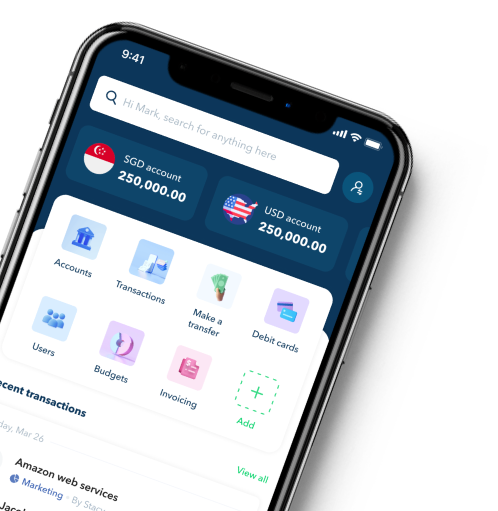Issue virtual cards at scale with Aspire's Card Issuance APIs
Programmatically create unlimited virtual cards to pay suppliers in real-time. Accelerating payments, improving cash flow, and mitigating fraud.

Trusted by 50,000+ modern businesses
Programmatically manage card creation with Card Issuance API
Issue unlimited virtual cards
Create one card per transaction and even set spend limits, expiration date or freeze/unfreeze cards.
Easy to integrate
Developer-friendly documentation with easy-to-integrate API.
Reduce paperwork
Your team uploads receipts from their phones. You close the books in half the time with direct accounting integrations.
Pay thousands of suppliers with instant-issue cards
Automate your card issuance process

Gain real-time control and visibility of spends

Automate your supplier payments

Developer-friendly integration

Hear it first from our customers


Gregory Van
CEO of Endowus


Holly Qian
Head of Finance, First Page Digital


William Chong
Finance Director at Glints




Frequently asked questions about Card Issuance API
What is a Card Issuance API?
A card issuing API (Application Programming Interface) is a set of tools and protocols that allows developers to integrate card issuance and management functionalities into their applications or platforms. These APIs enable businesses to create, distribute, and manage virtual or physical payment cards. Here are some key features and functionalities typically provided by card issuing APIs:
- Card Creation: Generate new virtual or physical cards with specific parameters (e.g., card type, spending limits, expiration dates).
- Card Activation: Activate issued cards for use by the cardholder.
- Card Management: Update card details, set spending limits, freeze/unfreeze cards, and handle card renewals or replacements.
- Transaction Monitoring: Track and manage transactions made with the issued cards, including real-time notifications for spending activity.
- Compliance and Security: Ensure that card issuance and usage comply with relevant regulatory requirements and incorporate security features to protect against fraud.
- Customization: Personalize cards with branding elements such as logos, colors, and designs.
- Integration with Payment Networks: Connect with payment networks like Visa, Mastercard, or others to enable transactions.
How do Card Issuance APIs work?
Card Issuance APIs allow businesses (e.g. e-commerce platfroms, marketing agencies etc.) to facilitate card issuance and management via card issuing platforms (e.g. Aspire, PayPal, Stripe etc.).
There are usually multiple steps involved in the Card Issuance API process. The first step is authentication, in which the company gives the API specific instructions, then authenticated by an API key. These instructions include elements like the customer's identity, the kind of card to be issues, spending caps, and so forth.
The issuing platform then undertakes validations and compliance checks to ensure the request meets the regulatory requirements, card network protocols and other predefined validations.
Once approved, the API uses the details provided in the API call earlier to create the cards by setting up business accounts, spending limits, card type etc. For physical cards, activation may be required, while virtual cards are usually activated automatically.
The process concludes with the API sending confirmation, from the issuing platform to the business, about each issued card, including card details and user information.
The API also enables businesses and individual users to manage their cards, make transactions, and track their spending in real-time.
What types of cards can be issued using a Card Issuance API?
Businesses can issue various types of cards using a Card Issuance API including debit cards, credit cards, prepaid cards, corporate cards, and co-branded cards. These can be either physical or virtual cards, depending on the business needs.
Each card type is generally further customized according to the business requirements e.g. a corporate card may come with features such as spend limits, merchant locks etc. whereas co-branded cards generally come with specialized reward programs. These customizations are tactfully and efficiently handled by Card Issuance APIs.
What are the benefits of using a Card Issuance API?
Card Issuance APIs provide several advantages - faster time-to-market, more personalization, real-time spend tracking, higher financial transparency, better risk and compliance management, and more control over card features and restrictions are a few of these. Additionally, it enables companies to better serve customers, employees and vendors while promptly adapting to changing market demands.
When employing Card Issuance APIs, how can organisations make sure they are in compliance?
When employing a Card Issuance API, businesses must carefully examine the following:
- Are the compliance procedures of the API provider up to date with the financial legislation
- Do they have robust security measures in place to guard against fraud, cyberattacks, and data leaks
- Do they comply with regulations like Know Your Customer (KYC) and Anti-Money Laundering (AML)
- Verify if all the transaction data is managed in compliance with the Payment Card Industry Data Security Standards (PCI DSS)
What are some common use cases for Card Issuance APIs?
Card-issuing APIs transform how businesses manage finances, fostering better relationships with employees, vendors, and customers. These APIs are widely used in sectors like fintech, retail, and on-demand services. Some of the common use cases for Card Issuance API are as below:
- Issuance of corporate cards with spending limits for expense management
- Travel-specific cards loaded with multiple currencies for convenient financial management abroad.
- Issuance of cards to partners or vendors for easy invoicing and instant payments
- Subordinate accounts for vendors on e-commerce platforms to receive real-time payments.
What obstacles can companies encounter while adopting to Card Issuance APIs?
Regulatory compliance management, API integration's technical complexity, and ensuring a smooth interface with current systems are among the key challenges. It's possible that companies may also need to spend money on continuous system maintenance and employee training.
When utilizing a Card Issuance API, how long does it take to issue a card?
The speed at which cards can be issued is a significant benefit of Card Issuance APIs. Compared to traditional techniques, which frequently involved drawn-out procedures and wait times, businesses can provide cards almost instantly.
What factors should businesses consider when choosing a Card Issuance API provider?
Key factors that businesses should consider before choosing a Card Issuance API provider are as follow:
- Seamless integration
- Relevant customisation
- Water-tight compliance
- Rewards and incentives
- Comprehensive sandbox environment
Our blog on Card Issuance APIs covers each of these point in detail. Most importantly, businesses must ensure that they choose a provider that aligns with the specific needs and goals of their business.
Are card issuer APIs compatible with other banking systems?
Certainly, payment gateways, accounting software, and expense management platforms can all be integrated with card issuer APIs. This connection offers a consistent user experience while streamlining financial procedures.









